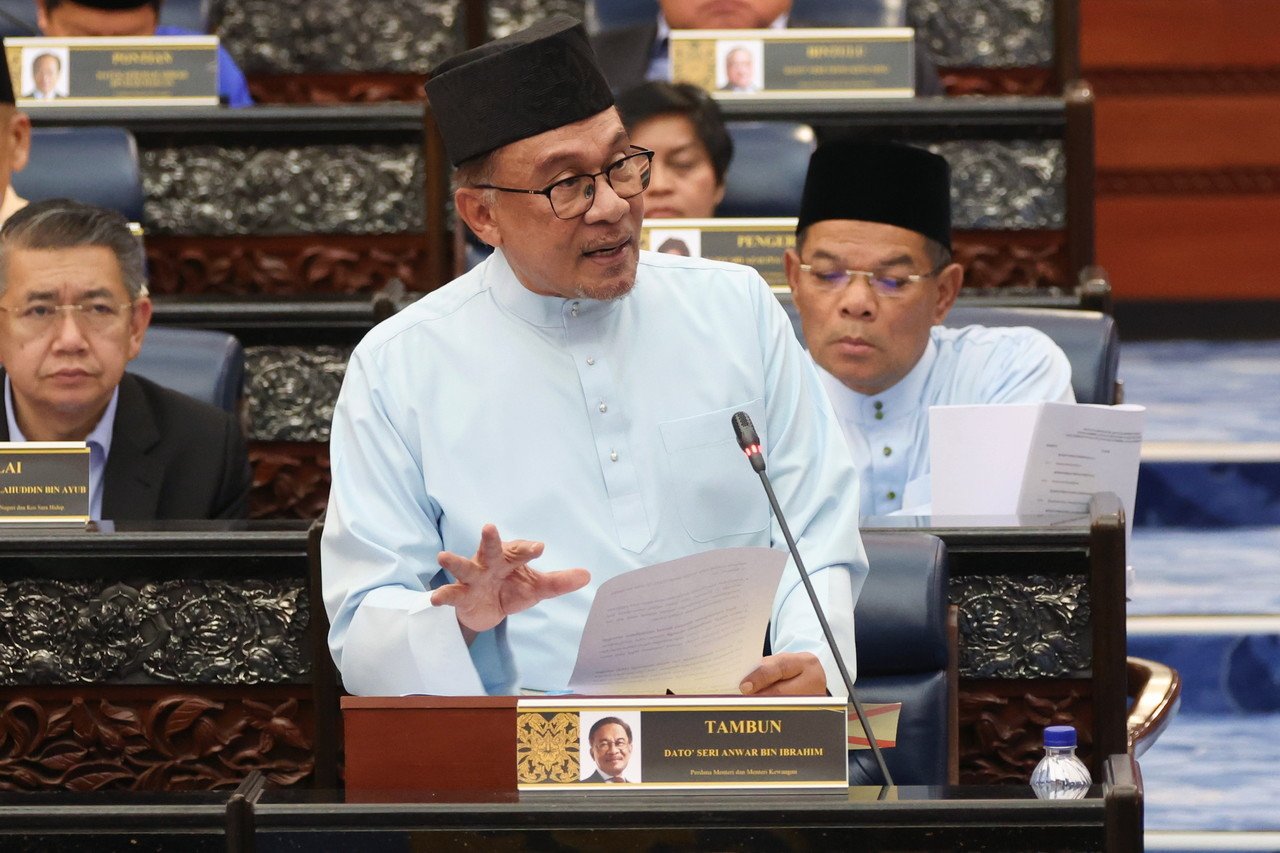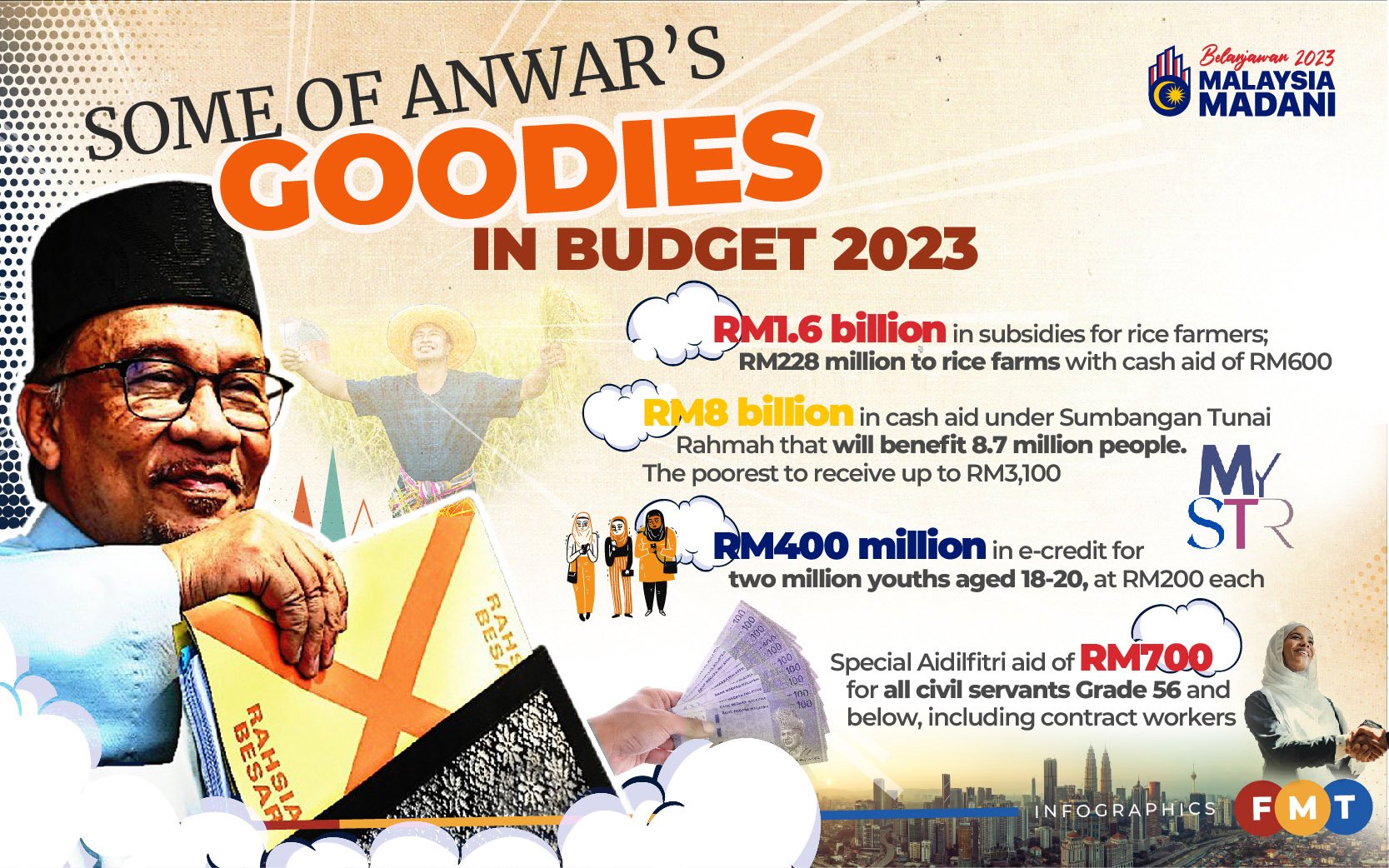FMT:
Anwar, a fiscal wizard?
The government has shifted the burden of reducing national debt to companies and the wealthy, says think tank.

Economic experts are unconvinced by finance minister Anwar Ibrahim’s policy moves to reduce the RM1.2 trillion national debt.
PETALING JAYA: Arguably the biggest challenge confronting Anwar Ibrahim in his first 100 days as the prime minister was tackling Malaysia’s crippling RM1.2 trillion national debt to prevent it from derailing the Malaysian economy.
Last month, Anwar himself drew the nation’s attention to the massive debt – RM1.5 trillion if you include government liabilities – and stressed it was imperative that a solution be found.
His chance to show the nation he could tackle it was at the re-tabling of Budget 2023 on Feb 24. Anwar was under pressure to reduce the budget or fiscal deficit which amounted to RM99 billion or 5.5% of gross domestic product (GDP), based on the original Budget 2023 tabled last October.
Like the proverbial magician, he successfully pulled a rabbit out of the hat when he proudly announced Budget 2023 will have a lower budget deficit of RM94 billion or 5% of GDP.
Anwar’s iteration of Budget 2023 contained revenue raising measures such as new taxes on luxury goods, excise duties on vapes and e-cigarettes, and raised income tax rates for high-earners.
The government will also examine the introduction of a capital gains tax on sales of non-listed company shares from 2024.
Experts unimpressed
While these measures were lauded by many, the experts are unconvinced by Anwar’s policy moves on debt reduction.
They point out the revised Budget 2023 was the country’s biggest ever at RM386.1 billion, RM13.8 billion more than the budget tabled last October, and RM54 billion more than Budget 2022.
Fitch Ratings said the relatively modest pace of deficit reduction announced by Anwar so far means public finances will remain “vulnerable to economic shocks and spending pressures”.
In a recent statement, it said the deficit reduction “reflects more optimistic” growth forecasts for revenue and nominal GDP.
“The gradual pace of deficit reduction will make a reduction in public debt to GDP over the medium-term dependent to a large extent on continued robust economic growth.”
It also does not expect the latest revenue raising measures such taxes on luxury goods and the rich to have a significant impact on public finances.
What the ratings agency is essentially saying is that Anwar’s fiscal deficit projection of 5% is only attainable if there is strong economic growth and relatively high oil prices.
As finance minister entrusted with steering the Malaysian economy, it is hardly prudent for Anwar to assume that Malaysia’s economic growth will be robust and that crude oil prices will remain at current high levels above US$80.
What happens if there is a major economic recession, and crude oil and palm oil prices start to plummet?
“A risk remains that further shocks to GDP growth or fiscal slippages could result in debt to GDP continuing to increase,” said Fitch, adding the trajectory of government debt remains a “key rating sensitivity for Malaysia”.
Shifting the debt burden
Think tank Center for Market Education (CME) said Anwar’s Budget 2023 lacks a comprehensive strategy for a holistic tax reform and does not attempt to rationalise government expenditures.
“Instead of cutting expenses, the government aims at reducing the debt by introducing questionable taxes like the luxury goods or higher income tax for certain income brackets,” CEO Carmelo Ferlito said in a statement.
He was also surprised by the absence of targeted subsidies in the revised budget. “Nothing is done on targeted subsidies.
“Rather, the amount of subsidies and handouts increases, showing the government has no intention to move toward fiscal discipline and balanced budgets, shifting the burden of reducing debt to firms and individuals,” he added.
Ferlito said that without government fiscal discipline, the country is unlikely to make a move in the direction of a sustainable growth path.
Anwar, in his budget speech, revealed the government will be allocating up to RM64 billion for subsidies, assistance, and incentives.

Little impact from tax initiatives
Universiti Teknologi MARA public policy lecturer Firdausi Suffian said the new tax measures are unlikely to produce any real effect, and is rather a signal by the administration to portray Anwar as supporting the B40 (bottom 40% of the population).
Under Budget 2023, the personal income tax rate was reduced by 2% for those earning between RM35,000 and RM100,000, benefiting around 2.4 million taxpayers. In contrast, the increase in income tax by 0.5% to 2% for those earning RM100,000 to RM1,000,000 affects less than 150,000 citizens.
Compared to the goods and services tax (GST), which can raise up to RM42 billion annually, the new tax rates are unlikely to reach even half that amount, Firdausi tells FMT Business.
On the new luxury goods tax, he said although it seems like a progressive tax, its definition is still unclear.
“We cannot assume only the rich buy luxury goods because the middle class do as well,” he said, adding the tax will result in a fall in sales and production.
Public sector wage bill poser
Monash University Malaysia economics professor Niaz Asadullah says given the complex political environment, Anwar’s government may be exercising caution by adopting “a staggered fiscal reform plan”.
“At a time of rising cost of living and rising national debt, the country needs smart fiscal measures, and this means a smaller and smarter bureaucracy,” he told FMT Business.
He said narrowing the fiscal deficit or lowering the debt-to-GDP ratio will be hard to achieve with a 1.6 million civil service workforce. The public sector wage bill has increased steadily as a percentage of public expenditure in the last decade.
“In consequence, about one-third of the total public expenditure (2023 operating expenditure: RM289 billion) goes towards financing the wage bill, compared to OECD countries that spend on average only one-fifth (20%)
“So, the civil workforce limits the fiscal space regardless of addition to revenue from new taxes,” Niaz added.
PETALING JAYA: Arguably the biggest challenge confronting Anwar Ibrahim in his first 100 days as the prime minister was tackling Malaysia’s crippling RM1.2 trillion national debt to prevent it from derailing the Malaysian economy.
Last month, Anwar himself drew the nation’s attention to the massive debt – RM1.5 trillion if you include government liabilities – and stressed it was imperative that a solution be found.
His chance to show the nation he could tackle it was at the re-tabling of Budget 2023 on Feb 24. Anwar was under pressure to reduce the budget or fiscal deficit which amounted to RM99 billion or 5.5% of gross domestic product (GDP), based on the original Budget 2023 tabled last October.
Like the proverbial magician, he successfully pulled a rabbit out of the hat when he proudly announced Budget 2023 will have a lower budget deficit of RM94 billion or 5% of GDP.
Anwar’s iteration of Budget 2023 contained revenue raising measures such as new taxes on luxury goods, excise duties on vapes and e-cigarettes, and raised income tax rates for high-earners.
The government will also examine the introduction of a capital gains tax on sales of non-listed company shares from 2024.
Experts unimpressed
While these measures were lauded by many, the experts are unconvinced by Anwar’s policy moves on debt reduction.
They point out the revised Budget 2023 was the country’s biggest ever at RM386.1 billion, RM13.8 billion more than the budget tabled last October, and RM54 billion more than Budget 2022.
Fitch Ratings said the relatively modest pace of deficit reduction announced by Anwar so far means public finances will remain “vulnerable to economic shocks and spending pressures”.
In a recent statement, it said the deficit reduction “reflects more optimistic” growth forecasts for revenue and nominal GDP.
“The gradual pace of deficit reduction will make a reduction in public debt to GDP over the medium-term dependent to a large extent on continued robust economic growth.”
It also does not expect the latest revenue raising measures such taxes on luxury goods and the rich to have a significant impact on public finances.
What the ratings agency is essentially saying is that Anwar’s fiscal deficit projection of 5% is only attainable if there is strong economic growth and relatively high oil prices.
As finance minister entrusted with steering the Malaysian economy, it is hardly prudent for Anwar to assume that Malaysia’s economic growth will be robust and that crude oil prices will remain at current high levels above US$80.
What happens if there is a major economic recession, and crude oil and palm oil prices start to plummet?
“A risk remains that further shocks to GDP growth or fiscal slippages could result in debt to GDP continuing to increase,” said Fitch, adding the trajectory of government debt remains a “key rating sensitivity for Malaysia”.
Shifting the debt burden
Think tank Center for Market Education (CME) said Anwar’s Budget 2023 lacks a comprehensive strategy for a holistic tax reform and does not attempt to rationalise government expenditures.
“Instead of cutting expenses, the government aims at reducing the debt by introducing questionable taxes like the luxury goods or higher income tax for certain income brackets,” CEO Carmelo Ferlito said in a statement.
He was also surprised by the absence of targeted subsidies in the revised budget. “Nothing is done on targeted subsidies.
“Rather, the amount of subsidies and handouts increases, showing the government has no intention to move toward fiscal discipline and balanced budgets, shifting the burden of reducing debt to firms and individuals,” he added.
Ferlito said that without government fiscal discipline, the country is unlikely to make a move in the direction of a sustainable growth path.
Anwar, in his budget speech, revealed the government will be allocating up to RM64 billion for subsidies, assistance, and incentives.

Little impact from tax initiatives
Universiti Teknologi MARA public policy lecturer Firdausi Suffian said the new tax measures are unlikely to produce any real effect, and is rather a signal by the administration to portray Anwar as supporting the B40 (bottom 40% of the population).
Under Budget 2023, the personal income tax rate was reduced by 2% for those earning between RM35,000 and RM100,000, benefiting around 2.4 million taxpayers. In contrast, the increase in income tax by 0.5% to 2% for those earning RM100,000 to RM1,000,000 affects less than 150,000 citizens.
Compared to the goods and services tax (GST), which can raise up to RM42 billion annually, the new tax rates are unlikely to reach even half that amount, Firdausi tells FMT Business.
On the new luxury goods tax, he said although it seems like a progressive tax, its definition is still unclear.
“We cannot assume only the rich buy luxury goods because the middle class do as well,” he said, adding the tax will result in a fall in sales and production.
Public sector wage bill poser
Monash University Malaysia economics professor Niaz Asadullah says given the complex political environment, Anwar’s government may be exercising caution by adopting “a staggered fiscal reform plan”.
“At a time of rising cost of living and rising national debt, the country needs smart fiscal measures, and this means a smaller and smarter bureaucracy,” he told FMT Business.
He said narrowing the fiscal deficit or lowering the debt-to-GDP ratio will be hard to achieve with a 1.6 million civil service workforce. The public sector wage bill has increased steadily as a percentage of public expenditure in the last decade.
“In consequence, about one-third of the total public expenditure (2023 operating expenditure: RM289 billion) goes towards financing the wage bill, compared to OECD countries that spend on average only one-fifth (20%)
“So, the civil workforce limits the fiscal space regardless of addition to revenue from new taxes,” Niaz added.
No comments:
Post a Comment